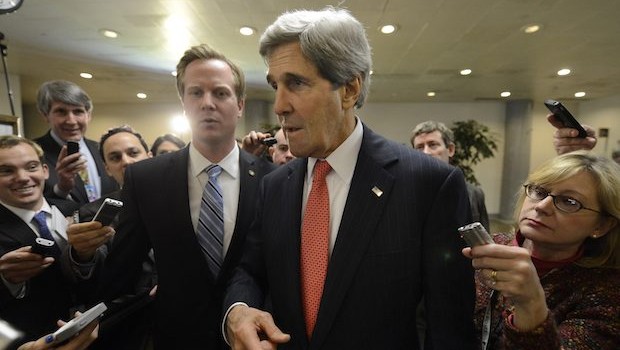
US Secretary of State John Kerry (C) is surrounded by members of the news media after leaving a closed briefing for US Senators given by himself and US Treasury Secretary Jack Lew (not pictured), on the status of nuclear talks with Iran on Capitol Hill in Washington, DC, on December 11, 2013. (EPA/MICHAEL REYNOLDS)
London, Asharq Al-Awsat—The US government today blacklisted several foreign companies and individuals, accusing them of helping Iran circumvent sanctions on its oil exports and assisting its controversial nuclear program.
The move, carried out under existing US sanctions legislation on Iran, freezes the assets of the companies and individuals and prohibits any dealings between them and US companies and citizens.
In a statement issued by the US Treasury and State Departments, US Under-Secretary for Terrorism and Financial Intelligence David S. Cohen said: “Today’s actions should be a stark reminder to businesses, banks and brokers everywhere that we will continue relentlessly to enforce our sanctions, even as we explore the possibility of a long-term, comprehensive resolution of our concerns with Iran’s nuclear program.”
Four companies have been added to the blacklist—two based in Singapore, one in Cyprus, and one in the Philippines—as well as individuals connected with them, which the US alleges have aided Iran in circumventing sanctions on Iranian crude oil shipments by the National Iranian Tanker Company.
The US has also barred five Iranian companies, which it says are engaged in procuring parts for Iran’s nuclear and ballistic missile development programs, along with several individuals Washington says are connected with them.
Today’s move follows a clash between the Obama administration and lawmakers in Congress over Congressional plans to impose additional sanctions on Iran, leading observers to speculate it was an attempt to show resolve on the issue and reduce congressional pressure.
The blacklisting is seen as less likely to raise Iranian hackles, as it was imposed by presidential order under existing sanctions laws.
The administration says that new congressional sanctions will undermine international diplomatic negotiations over Iran’s nuclear program. Iran and the P5+1—the five permament members of the UN Security Council plus Germany—reached an interim agreement in Geneva at the end of November to ease some of the sanctions on Iran in return for Iran suspending some of its nuclear activities.
The agreement also says that no new sanctions will be imposed for a period of six months.
Speaking before the House of Representatives’ foreign affairs committee on Tuesday, US Secretary of State John Kerry said that negotiations with Iran had reached “a delicate diplomatic moment.”
He also warned that new sanctions “could lead our international partners to think that we’re not an honest broker, and that we didn’t mean it when we said that sanctions were not an end in and of themselves but a tool to pressure the Iranians into a diplomatic solution.”
Iran’s foreign minister, Mohammad Javad Zarif, previously warned that new congressional sanctions risked scuppering the deal reached in Geneva.
He told TIME magazine earlier in the week: “If Congress adopts sanctions, it shows lack of seriousness and lack of a desire to achieve a resolution on the part of the United States . . . My parliament can also adopt various legislation that can go into effect if negotiations fail. But if we start doing that, I don’t think that we will be getting anywhere.”
Although the head of the US Senate’s Banking Committee, Senator Tim Johnson, said on Thursday that he was opposed to new sanctions, two senators on the Senate’s Foreign Relations Committee are reportedly close to completing new draft sanctions legislation.
Aides of committee chairman Senator Robert Menendez and Senator Mark Kirk told reporters yesterday that they were preparing a bill to impose additional sanctions on Iran if no progress had been made at the end of the interim agreement’s six-month deadline, or if Iran breached the conditions.
